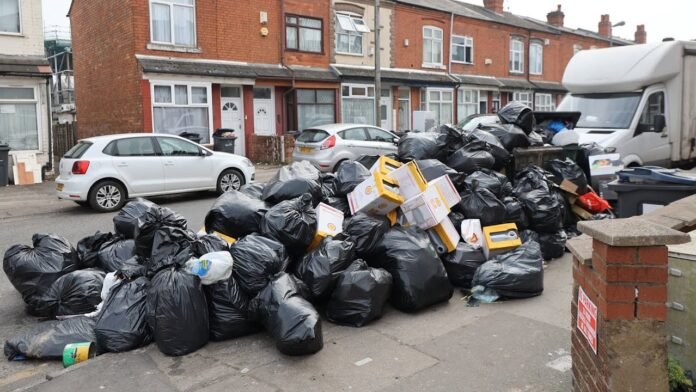Unite accuses ministers of hiding behind false claims while 17,000+ tonnes of rubbish blights Birmingham
Unite union boss Sharon Graham has launched a blistering attack on the government, accusing ministers of “sitting on their hands” as the Birmingham bin strike grinds on with no end in sight and rubbish continues to mount on city streets.
In a letter to Deputy Prime Minister Angela Rayner, leaked to the BBC, Graham claimed ministers were relying on “false narratives” to distance themselves from the row that has left more than 17,000 tonnes of waste uncollected since industrial action began on 11 March.
Refuse collectors have taken to mobile rubbish drop-off points as overflowing bins pile high, fuelling resident anger and drawing comparisons to the 1970s’ “winter of discontent”.
Unite argues a planned pay restructure will leave some workers as much as £8,000 a year worse off, while around 20 more could lose £2,000. The Labour-run city council disputes those figures, insisting only 17 workers would see up to a £6,000 reduction, and that a version of the plan exists where “no worker needs to lose a penny”.
Embed from Getty ImagesBut Graham pulled no punches in her letter to Rayner: “Let me be clear. The pay of these workers is being cut by a Labour council under your watch. That is a fact that can’t be avoided.”
She accused the local authority of conducting sham negotiations, claiming real decisions were being taken not in council chambers but behind closed doors, influenced by government-appointed commissioner Max Caller. “This predetermined charade is played out after consultation with those outside the room,” Graham alleged.
Caller, brought in during last year’s financial collapse at the council, is meant to act in an advisory capacity but is, according to Graham, effectively calling the shots. Birmingham was forced to declare effective bankruptcy in 2023, following a £1bn equal pay scandal and has since been repaying £250 million a year — most of it to the Treasury — on a £3.9 billion debt.
Graham said those historic failures should not be shouldered by bin workers. “My members’ pockets are being picked to make savings,” she said. While acknowledging the government has little appetite for cancelling council debt, she urged ministers to at least review the length of repayments and interest rates.
The strike’s impact has gone far beyond street hygiene. Residents have reported animals rooting through piles of waste, and a major incident was declared earlier this week due to public health concerns. Yet Graham, notably absent from picket lines, has now re-emerged with her strongest intervention yet, demanding an emergency meeting with council leaders and pressing Rayner to get personally involved.
Despite the growing chaos, Rayner has not responded publicly to Graham’s claims. Meanwhile, local government minister Jim McMahon visited Birmingham this week, urging both sides to “redouble their efforts” to resolve the dispute. He insisted the government remains committed to supporting the city but warned the impasse cannot continue.
“Residents want this rubbish dealt with as soon as possible,” he said. “It’s in everyone’s interest that this strike is brought to a close.”
Birmingham City Council insists the bin strike has nothing to do with its debts. A spokesperson said: “We need to modernise the waste service and eliminate any future equal pay risk. A fair and reasonable offer remains on the table.”
Unite, however, is unconvinced. Graham warned the crisis could become the tip of the iceberg for local government nationwide. “Unless we address the root causes, we’re heading for a full-blown collapse of council services,” she said.
For now, bin bags continue to line the pavements of Britain’s second city — a visual, and increasingly political, reminder of the cost of municipal failure.
THE TELEGRAPH
A strike by refuse workers in Birmingham has left nearly three million wheelie bins’ worth of waste rotting on city streets, sparking a public health crisis and fears of a financial disaster for the council. The ongoing industrial action, which began in March after intermittent walkouts earlier in the year, was triggered by the Labour-run council’s scrapping of a key refuse worker role. Estimates suggest 13.8 million bin bags remain uncollected, attracting rats “as big as cats.” While the council estimates 17,000 tonnes of waste, private firm Divert claims the true figure could be far higher. Emergency cleaning crews have been deployed, and the council may seek government help. Tory MPs are urging a Cobra meeting, warning of danger to residents. Unite union leader Sharon Graham vowed to defend workers “to the hilt.” The crisis underscores deep tensions between local government austerity and union resistance to job cuts.
SKY NEWS
Birmingham is grappling with a worsening rubbish crisis as the bin workers’ strike, now in its fourth week, leaves neighbourhoods overwhelmed by filth, foul odours and massive rats. In Highgate, piles of rubbish, including used nappies and rotting food, are spilling onto the streets. Residents like Mickel describe foxes and rats “the size of cats,” while Chris admits she’s terrified of rodents but sympathises with the strikers, urging fair pay for such demanding work. Even as rubbish mounts, many locals support the workers’ cause. At Lifford Lane tip, the strike’s epicentre, residents like Brigette arrive with cars full of rubbish, apologising for the unbearable smell. Despite the public health hazard, residents show a mix of frustration and solidarity. The standoff continues over the council’s restructuring of refuse jobs. Meanwhile, the city faces mounting pressure to act swiftly, as the sanitation crisis deepens and health concerns grow in Birmingham’s most affected areas.
